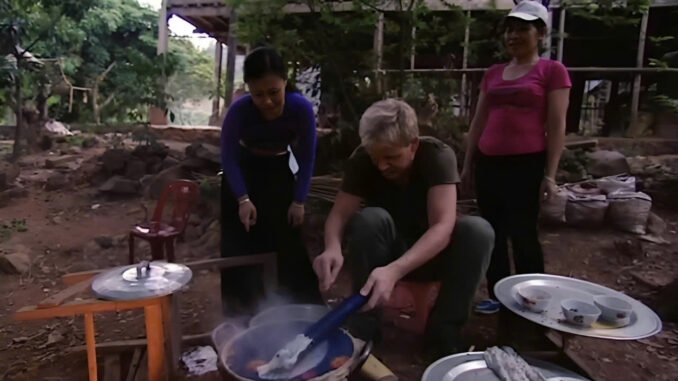
Gordon Ramsay has built a global reputation on precision, discipline, and an unshakeable command of the kitchen. With 17 Michelin stars earned across his career, he has conquered some of the world’s most demanding culinary landscapes. But during a recent trip to Vietnam, the famously fiery chef encountered a surprising challenge—one that left him laughing, humbled, and openly admitting defeat.
The dish was bánh cuốn, a deceptively simple Vietnamese staple consisting of thin steamed rice sheets filled with minced pork and mushrooms. To the untrained eye, it looks effortless: a ladle of batter, a swirl of steam, and a graceful scoop that rolls the delicate sheet into a perfect cylinder. But as Ramsay quickly discovered, mastering bánh cuốn requires a level of finesse that pushes even top-tier chefs to their limits.
Video of Ramsay attempting the dish captured a rare sight: the world-renowned chef visibly struggling, repositioning his hands, and shaking his head as the rice sheet repeatedly tore under his touch. After several attempts, he burst into laughter and delivered a line that immediately went viral in Vietnam:
“Thank God I didn’t grow up in Vietnam—otherwise I’d be a useless chef.”
His reaction, both honest and self-deprecating, resonated deeply with viewers. For many Vietnamese fans, it was refreshing to see a Michelin-starred figure bow to the artistry of everyday street food vendors—many of whom have perfected their craft over decades without formal culinary training. For Ramsay, it was another reminder of the extraordinary complexity embedded within Southeast Asian cuisine.
Ramsay has long expressed admiration for Vietnamese food. He has spotlighted several dishes—from bún riêu to cơm hến—in previous travel and culinary programs, often praising the balance, technique, and meticulous detail found in local cooking. But bánh cuốn presented a unique challenge: a dish that looks soft and understated, yet demands exact timing, temperature control, and a delicate hand.
Culinary experts noted that Ramsay’s experience in Vietnam speaks to a broader truth within gastronomy: some of the world’s most technically demanding dishes aren’t found in Michelin-starred kitchens, but in bustling street markets where culinary traditions have been preserved for generations. The bánh cuốn masters who work effortlessly over steaming cloth pans represent a level of skill that even the most decorated chefs must respect.
Ramsay himself has always championed authenticity and cultural appreciation, and his candid struggle only fueled admiration from fans worldwide. Many praised him for approaching the challenge with humility instead of ego—a trait not always associated with his notoriously tough television persona.
If anything, the moment reinforces the beauty of global cuisine: no matter how accomplished a chef may be, there is always more to learn, especially from cultures where technique is passed down not through textbooks, but through family legacy and years of practice.
As Ramsay left Vietnam, he carried with him not only a renewed respect for the country’s culinary artisans but also a memory that fans will likely revisit for years: the day a Michelin-star titan met his match in a humble, delicate roll of bánh cuốn.
